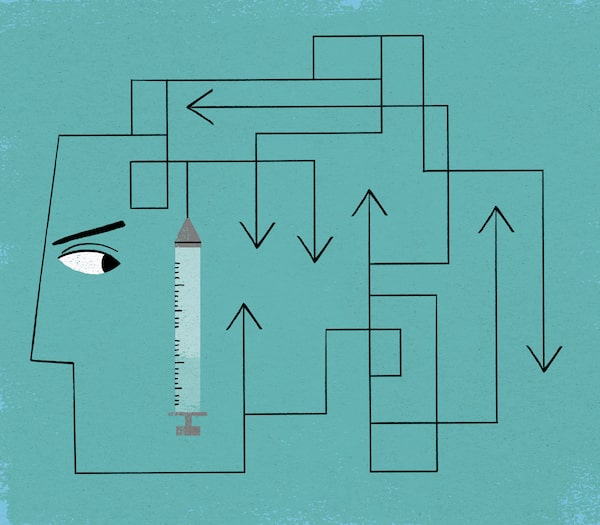
ILLUSTRATION BY HANNA BARCZYK
As I rode my bike to the pharmacy to get my first dose of the AstraZeneca vaccine, I was worried. No, not about the infinitesimal chance of developing a blood clot from the shot. I was worried about the Death Race 2000 of Toronto’s streets.
If you ride a bike here, you know that Toronto is not the greatest city for cyclists, and that’s putting it gently. Trucks park in bike lanes, drivers scoot up right behind you, car doors are flung open in your path. Yet I continue to ride, because I love it. It’s not like I ever sat down to do a cost-benefit analysis but if I did, I still think the pros (exercise, wind in my hair) outweigh the cons (might end up a blob on the street).
Riding a bike in a city: a little bit dangerous. Getting the AstraZeneca vaccine: really not dangerous at all. But, as my colleague André Picard points out, humans are very bad at calculating risk. This is why we’ll send a text while driving – super dangerous, not to mention illegal – but balk at receiving a potentially life-saving vaccine. In a recent poll, only 41 per cent of Canadians said they’d be comfortable getting the AstraZeneca jab.
Worry was not top of my mind as the nice pharmacist told me to roll up my sleeve, and regaled me with tales of riding around Montenegro on his motorcycle (talk about risky). The needle went in, and I felt only an immense sense of relief, and gratitude. The pharmacist told me that he wasn’t seeing any hesitancy in people signing up. In fact, he had a waiting list and not enough doses to meet the demand.
I’d read about the minor side effects I might feel, and indeed my arm was sore and I was a bit tired for a few days. But it seemed ridiculous to worry about a minute chance of blood clots, considering that I never worried about them during the many years that I took the birth control pill and smoked at the same time.
Editorial: Canada’s vaccine drive keeps hitting new speed bumps
The chance of developing a blood clot while taking the birth control pill is about 1 in 1,600. The chance of developing one after taking the AstraZeneca vaccine is about one in 250,000, according to Dr. Supriya Sharma, Health Canada’s chief medical adviser. Toronto’s Medical Officer of Health Eileen de Villa put that into perspective: It’s about the same odds as an airplane hitting your house. Possibly also the same odds as the Blue Jays winning the World Series, but we don’t want to get too negative here.
As we know, however, humans are not rational creatures. We respond to stories over facts. We see headlines about Denmark suspending the AstraZeneca vaccine, or read about one woman in Quebec developing a clot, and the danger assumes outsized proportions because of the prominence these stories receive in the media. (On the subject of irrationality, the word “clot” doesn’t help. Nothing good comes in clots.)
So if bombarding people with statistics doesn’t help with vaccine hesitancy, what does? All kinds of things as it turns out, but they’re strategies that require patience, empathy and understanding. These are things that might be in short supply during a pandemic, when every neighbour who isn’t vaccinated is a potential threat to the community.
But if we want to reach those people, yelling won’t work. In February of this year, the National Academies of Sciences, Engineering and Medicine put out guidelines for building confidence around vaccines, and the advice works on an individual level as well as across societies. The guidelines recommend that people’s concerns around vaccines should not be dismissed out of hand, which might cause a hardening of attitudes. Instead, the message should be, “I hear your concerns, and I understand them.”
People who are vaccine hesitant may have legitimate reasons to be leery about a health care system that has marginalized or dismissed them. One way to bring them on board is to use trusted voices within a community (Steph Curry talking to Dr. Anthony Fauci about vaccine efficacy, for example.)
Crucially, the guidelines recommend that advice about vaccines should be updated as new information arises. So, when the U.S. government decides to pause the rollout of the Johnson & Johnson vaccine to investigate possible instances of blood clots, that’s not a bad thing. It lets people know that side effects are being taken seriously, and that they can trust public health officials to be open and frank about the medication’s benefits as well as its possible consequences – no matter how small. An abundance of caution is worth a ton of public goodwill, in the long run.
For my part, I’ve decided to stop making jokes about how I got the “lesser” vaccine. “I’m getting the budget vaccine,” I joked to a friend, who gently chastised me. “They’re all good vaccines.” Of course she’s right. As I look around Ontario at the people who are scrambling to find vaccines – teachers and essential workers and those who live in hot zones – I am immensely grateful that I was able to access this potentially life-saving bit of hope. As Dr. Sharma said, in reiterating Health Canada’s confidence in the AZ jab, “Get whatever vaccine is available to you. It’s that simple.”
Instead, I’ve decided to change my messaging. In Germany, where the vaccine rollout has been disappointing and hesitancy unfortunately high, it was announced that Angela Merkel would be getting the AstraZeneca jab. That’s my new line. If it’s good enough for the Chancellor, it’s good enough for me.
Keep your Opinions sharp and informed. Get the Opinion newsletter. Sign up today.